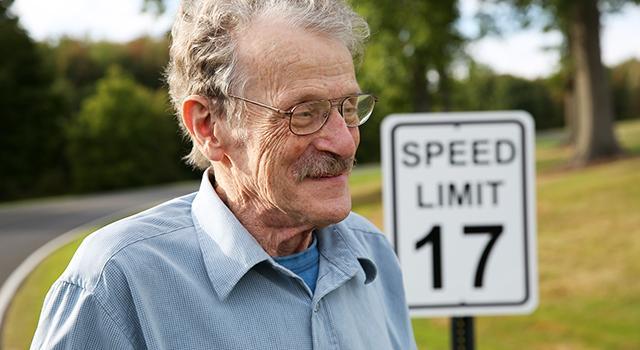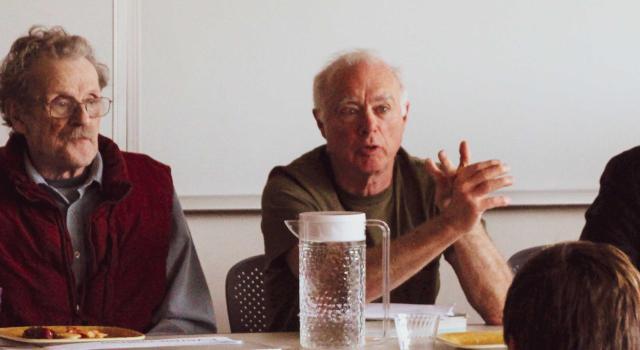Hampshire College Mourns Founding Faculty Member David C. Kelly

Emeritus Professor David C. Kelly — known to many simply as Kelly — died on June 10, 2025. He taught mathematics at the College from 1970 to 2015, and was founder and director of the Hampshire College Summer Studies in Mathematics program (HCSSiM), which is ongoing.
Kelly was one of the original faculty members at Hampshire and, with the late Ken Hoffman, the backbone of the math department for decades. Popular classes he taught included Complex Function Theory, Calculus in Context, and Puzzles and Paradoxes. Alongside Ken, he was a main force behind the creation of the Five Colleges Calculus in Context course and associated textbook, which is still taught at Hampshire.
Among his interests were analysis, probability, the history of mathematics, recreational mathematics, and the number 17, about which he could speak entertainingly at length regarding its mathematical and social history. Seventeen “has fascinated mathematicians for 2,000 years,” he said. “It has a lot of mathematical properties.” When he retired, Hampshire changed the campus speed limit to 17 miles per hour in his honor.
Kelly was born in New Rochelle, New York, and spent much of his childhood moving around, with a parent in military service. After finishing high school, a year early, he pursued his B.A. in mathematics at Princeton. A brief, unfulfilling stint in graduate school at MIT led him to transfer to Dartmouth, where he completed his graduate work.
While at Dartmouth, he fixed up a barn in Norwich, Vermont, where he lived, and reinstated Dartmouth’s Flying Club. He got a pilot’s license, and would later fly himself back and forth between Dartmouth and his various university appointments. Shortly before finishing his doctorate, he was offered a job at Talladega College. From there, he moved to New College, served a short stint at Oberlin, and was then recruited to be a founding faculty member at Hampshire, where he spent the rest of his career.
Kelly’s approach to teaching was visionary and empathic. He was a pioneer of inquiry-based learning, decades before the phrase was coined. Kelly was interested in getting students to develop and understand the importance of definitions; develop creative problem-solving skills with well-selected and open-ended problems; discover patterns through worked examples, advocating early on for experimentation with computer programs; formulate their own versions of theorem statements and proofs; and make their own connections to applications. In so doing, students developed important proof-writing skills and, moreover, a sense of ownership over the ideas.
Kelly used amusing anecdotes and creative framing of mathematical ideas as unfinished puzzles to stoke interest. Once he had the students’ attention, he would release the reins and “just get out of the way.” He was committed to giving students exposure to mathematics they wouldn’t have gotten otherwise. As part of this, he regularly hosted “cider donut math hours” over lunchtime, sharing his love of recreational mathematics with Hampshire students across academic disciplines.
He designed courses with broad appeal to inspire enthusiasm for learning mathematics and worked hard to infuse the subject into the fabric of the natural sciences. His office overflowed with puzzles, Escher prints, and mind-bending three-dimensional topological mobiles. A large supply of puzzles regularly rotated outside his office, encouraging students and other passersby to connect with recreational math and the joys of problem-solving. In his teaching, he imparted his passion for fun and beautiful mathematics. He helped students understand the development of mathematics through (often hilarious) stories and urged them to write their own chapters.
Before Hampshire’s founding, Kelly spent ten summers teaching and directing other math programs, including one at St Paul’s School in New Hampshire and one at the University of New Hampshire. In 1970, the same year Hampshire College opened, Kelly founded the Hampshire College Summer Studies in Mathematics (HCSSiM) program, which serves highly motivated high school students and continues to be recognized as “a national treasure.”
He was an advocate for making mathematics more welcoming to women, and actively recruited young women to the program. Kelly served as director until his last day, infusing his wit, love of mathematics, curiosity, and dedication throughout the program. HCSSiM welcomed 51 avid students to campus this summer, and will continue to keep his spirit alive.
Kelly is survived by his husband of 17 years (and partner for more than 51), Al MeNeely, their dog ’Pollo, and a large family, among them sister Sharon, brother Donnie, nieces Meghan, Morgan, Portia, Kate, and Mandy, nephew Daniel, and many grandnieces and grandnephews.
A private green burial graveside service was held at Wildwood Cemetery on June 20; plans for a memorial celebration will be announced at a future date.



